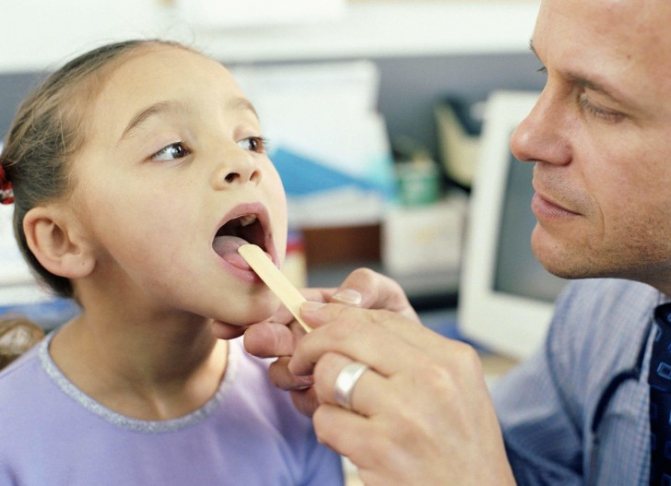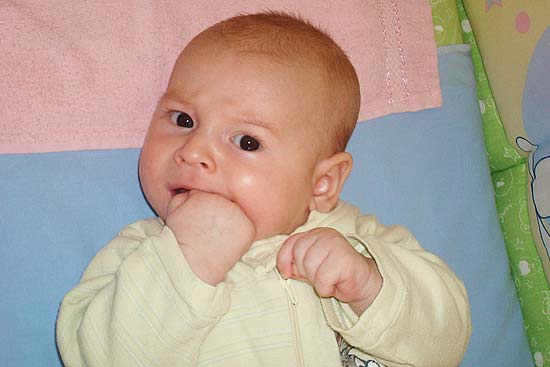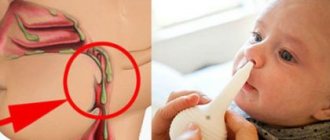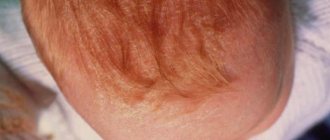After a newborn is born, he develops and matures every day. And parents watch with affection the changes in the child. However, there are a number of phenomena that may alarm happy mothers. These include increased salivation. Perhaps no one would pay attention to the fact that a two- or three-month-old child’s drool is flowing almost in streams. But no mother can calmly look at the consequences of increased salivation in a child. Irritation of the chin and diaper rash in the folds of the neck make parents seriously think about the reasons for the increase in the amount of saliva in the baby. This phenomenon is most often observed when the child is 3 months old. Drooling occurs during this period for a number of reasons, the main one being banal teething. However, there are more alarming factors that can cause a child to drool in bubbles.
Baby drools profusely - reasons
To understand whether you should panic and run to a doctor for help, or whether the baby will stop drooling on its own after a while, you need to know what caused the drooling. The main reasons why a two-month or three-month-old baby drools:
- . As mentioned earlier, if you notice that your baby is drooling a lot, this may mean that his teeth will soon appear. This period can begin as early as two months and last for one and a half years. You may not immediately see the relationship between excessive saliva and teething. After all, the baby feels their advancement deep in the gums, and this gives him discomfort and pain. And saliva is a natural anti-inflammatory agent that the body uses to try to alleviate gum inflammation. In this case, it is useless and impossible to combat increased salivation. Therefore, all that remains for you is to wait for the end of this period, alleviating the suffering of your baby. To do this, lubricate the baby’s gums with special gels and offer to chew on special rubber toys (rodents). If the baby experiences less pain, then less saliva will be produced.
- Increased activity of the salivary glands. Since the salivary glands of a newborn baby are not fully formed, they may experience interruptions in their functioning for the first few months of the baby’s life. As a result, saliva begins to be released in huge quantities, which is difficult for the child to swallow, and he drools out. This phenomenon occurs quite rarely and usually goes away quickly. Therefore, there is no need to panic.
- The baby's body fights bacteria. Everyone knows that already a two-month-old baby is trying to taste everything. It is impossible to make every object surrounding it completely sterile, so there is always a risk of developing a disease such as stomatitis. In this case, with the help of saliva, the body tries to cleanse itself of uninvited guests, washing away germs and bacteria. This is where parents complain that their child has begun to drool heavily.
- Hypersalivation. I would like to express my hope that you will encounter this term exclusively in this article. After all, it indicates that the child has more serious diseases, which include disruption of the nervous system, brain diseases and the formation of tumors. Only a specialist can identify hypersalivation, so do not try to independently detect incoordination of movements in your baby. After all, it is impossible for an ordinary person to do this in a newborn.
The reason for the increased salivation does not in any way determine how much the baby suffers from the consequences of constant dampness of the chin. Therefore, parents should know how to prevent them in a timely manner.
Cough in a baby: how to treat
Treatment of cough in an infant is necessary only if it is infectious and allergic in nature. Only a pediatrician can understand the causes of the disease and determine the format of treatment. Usually this is a complex treatment, which includes special medicines, vitamins, and physiotherapy.
But there are recommendations and folk remedies for coughs that will help parents alleviate the baby’s suffering:
- With a physiological cough - reactions to saliva and milk entering the respiratory system:
- Let the child clear his throat: lift him up, or better yet, stand him up in a column. Do not hit the back under any circumstances.
- If the cough is prolonged, then pediatricians recommend using a tricky technique that works flawlessly on babies - quickly click your tongue. The clicking sets the rhythm of breathing, it is restored, and the cough recedes.

- For allergic cough:
- Conduct an audit of items and substances that can cause a baby to cough and eliminate them. Household allergens include: animal hair, items made from sheep's wool, fish food, perfume, indoor plants, mold, construction dust.
- Carry out wet cleaning regularly without using strong-smelling disinfectants.
- Ventilate the room regularly for at least 30–40 minutes.
- Do not turn on the air conditioning when a child is in the room.
- Humidify the air.

- Help with infectious cough:
- Aroma oils. Humidify the air by adding essential oils to the device: eucalyptus, anise, juniper, camphor, pine and peppermint oil. They can only be used if there is no allergic reaction.
- Inhalations. Do them using a nebulizer or inhaler. Without a doctor’s recommendations, you can alleviate the course of a child’s illness only with regular steam without any additions.
- Massage. Massage is done only if there is no acute illness - fever. To perform this procedure, place the baby head down (the head should be slightly lower than the body). Run your hand along the back from the shoulder blades to the shoulders 5-6 times. Turn the baby over and move upwards along the center of the chest with smoothing movements. After the procedure, wrap the child up and put him to sleep.
- Rubbing. For rubbing, use special pharmaceutical compositions recommended by the Association of Pediatricians, as well as goat and badger fat. Camphor oil is effective, but it can only be used after 6 months and if the child does not have allergies.
Do not decide on your own how to treat a cough in a baby. The doctor makes precise and effective prescriptions, but you can use available folk remedies - rubbing, aroma additives, physiotherapy.
Do not try to cure a cough quickly, do not try to use all the remedies at once. This can only cause harm. Take a holistic, intelligent approach to addressing this symptom. Keep the house clean and free of factors that irritate the child’s immune system.
How to help your child
Despite the fact that most of the causes of increased salivation in infants cannot be corrected, every mother wants to help her child survive a problematic period in his life. This can be done.
- Keep your child's clothes dry. If saliva is released in large quantities, tie him a waterproof “bib”. This way you will save your baby from discomfort and irritation in the neck area.
- When going for walks, offer your baby a pacifier, which will make it easier for him to swallow saliva.
- If your baby is teething, do not limit yourself to simply lubricating the gums with gels. Try to scratch and massage your gums with your finger as often as possible. Just remember that you must wash your hands thoroughly before this procedure.
If your baby grows and develops correctly, then the appearance of increased drooling cannot be avoided. Therefore, the main thing for parents to remember is that all this is short-term, and after a few months you won’t even remember how you had to constantly wipe your baby’s chin and change his clothes. And in order not to get lost in guesswork and make diagnoses yourself, it is better to immediately ask your local pediatrician for advice. Then both you and your baby will be calm.
Causes of fist and finger sucking

This may indicate hunger or a desire to drink.
This process may also be due to the onset of teething. In this case, the baby feels discomfort; the gums may be sensitive, irritated, itchy, etc. If the problem is in the teeth, then the fist can be replaced with a special teether, which can be chewed without problems all day long. They often have special tubercles and pimples, as well as a cooling effect. They are pleasant to chew on and can be wiped with a damp cleaning cloth and used on a walk or on the road.
Infants often suck their fingers after or before feeding, thus indicating that they have not yet “pumped” or are simply hungry. After all, the baby eats the main portion of milk in the first 5-10 minutes, and the rest of the time they suck just “for pleasure.” If your baby puts his fingers in his mouth after breastfeeding, you may be holding him less at the breast than he needs.
At an older age, a child may suck fingers if he lacks parental love and affection.
Sometimes thumb sucking becomes a sedative - this is how the baby instinctively relieves excessive excitement or calms himself before bed.
There is no point in weaning children off sucking. When the need for this disappears, the instinct fades away - the baby himself will stop. If you do not allow a child to do what the body requires, this may in the future result in uncertainty, complexes and other unpleasant consequences. Realization of instincts, among other things, helps to fully enjoy childhood, gain a sense of security and trust. To prevent excessive saliva from causing discomfort, you can carry a pack of wet wipes with you and wipe your baby as needed.
Saliva and its functions
Saliva is necessary for the body at any age. In the oral cavity, under the tongue, on the inside of the cheeks, behind the lower teeth, there are salivary glands. They work constantly, producing up to two liters of fluid per day for an adult.
Saliva takes care of maintaining pH in the desired state, preventing the formation of tartar and caries. Saliva destroys harmful microorganisms, thereby preventing unpleasant odor in the mouth.
Saliva is involved in processing and digesting food. Salivary enzymes help break down and digest substances and produce glucose from starch.
Hypersalivation
If we consider salivation from a physiological point of view, then in this process the mutual work of receptors in the periphery and the brain is assumed. The idea is that when saliva accumulates in the mouth, a command is transmitted along the motor pathways to the brain to swallow it. If the functioning of the reflex sensorimotor arc is disrupted, as a result of a distortion of sensitivity, or in other words, with hypoesthesia, the flow of information from the oral cavity does not reach the brain. This leads to the fact that the number of involuntary swallows decreases during the day, which means that the amount of saliva increases.
In order to restore reflex swallowing, it is necessary to correct the sensorimotor arc. In order to overcome this problem, you need to try to create conditions under which the brain will begin to receive sufficient information again.

Only a doctor can choose a method of treatment for complicated salivation; the main thing is not to leave everything to chance, the disease will not go away on its own
Cryotherapy is considered the most effective way to combat hypersalivation. The essence comes down to running an ice stick over the baby’s tongue. Naturally, this approach does not provide one hundred percent guarantees, but if drooling does not stop completely, then at least it is significantly reduced. Cryotherapy does not work instantly, but requires endurance and perseverance, but it is less painful than surgery and dental correction.
Baby care rules

What will help cope with the problem?
- Rapid teething . Usually they really begin to erupt no earlier than six months later. But cases of the first appearance of teeth have been recorded in the second and third months of life. And during the first year and a half, it will be difficult to do anything about excessive salivation. But you can buy special toys filled with water for your baby. They are also called teethers or chewers. This will help reduce the baby's discomfort.
- The salivary glands are overactive . It may simply be a developmental period that passes in a couple of months. You don’t have to do anything, just spend more time caring for your child. The problem will gradually disappear on its own.
- A way to fight infection . This case is also described above. The child very actively explores the surrounding objects. This also goes away with time. You need to keep an eye on your baby, pay more attention to games, choose hypoallergenic toys, and monitor his whereabouts.
- Hypersalivation. This is the name for increased salivation if it is a symptom of a disease.
It is necessary to urgently consult a doctor. It is better to identify the disease at the first stage, so that the treatment process is easier.
You need to monitor your baby carefully and examine him regularly in order to correctly identify all other signs of disease.
The rules for caring for a baby are quite simple.
Special fabric pads will help cope with excess amounts of such fluid. Unpleasant sensations can arise not only in the parents, but also in the baby, although he will not be able to say about it. Therefore, the task of parents is to make his first months more comfortable. You can use ointments, this is necessary if inflammation occurs. They need to be healed, which is why creams and ointments are used. The most important thing is to take care of the child’s cleanliness and not to get upset for no reason; this period will pass quickly enough. It is necessary to pay more attention to the baby’s well-being so that this stage does not affect him in any way. [tube] https://www.youtube.com/watch?v=cHqLEkto8iw ">
Why does an infant drool - reasons and what to do?
Instead of a preface. The functions of saliva in preserving the integrity of oral tissues are provided, first of all, by its secretion, unstimulated at rest; its food-related functions are ensured by the stimulated flow of saliva during the meal itself. Newborn saliva. A newborn produces little saliva in the oral cavity; it appears mainly at the age of 3 months and reaches its maximum amount by 6 months.
With artificial feeding, saliva appears earlier. Saliva helps the baby to suck, and also, in contact with milk, contributes to the formation of tender and loose clots in the stomach, which makes it easier to digest. Infants do not have the enzyme in their saliva that breaks down starch, so they should not be given bread soaked in milk. Print version. This enzyme is activated gradually and reaches normal levels only by two years.
Report a bug to info corp. Reader comments. Leave a comment. The opinions of the authors of published materials may not coincide with the position of the editors. With full or partial use of editorial materials, an active, indexable hyperlink to km. Multiportal KM. RU: current news, author's materials, blogs and comments, photo and video reports, mail, encyclopedias, weather, dollar, euro, abstracts, TV program, entertainment.
Sitemap If you would like to give us advice on how to improve the site, you can do so here. Organizations prohibited on the territory of the Russian Federation. Online publication KM. The main acts of oral digestion are sucking, chewing and swallowing, which are motor or motor acts, and salivation, which is a secretory act. The oral cavity plays an extremely important role in ensuring the initial stages of digestion, as well as subsequent stages - gastric and intestinal.
Food remains in the oral cavity for about 16-18 seconds, during which time it is mechanically crushed, ground, moistened with saliva and transformed into a food bolus. In the oral cavity, the taste qualities of food are analyzed and tested, and its chemical processing begins using various enzymes, in particular amylolytic ones [1, 2, 3, 6, 7, 8]. During the process of oral digestion, numerous receptors of the oral cavity are irritated, which provides reflex stimulation of the activity of the salivary glands, digestive glands of the stomach, pancreas, liver, duodenum, as well as the motor and evacuation activity of the gastrointestinal tract.
The process of absorption of water and some medications partially begins in the oral cavity [1, 3, 4, 5, 6, 7, 8]. The act of sucking is a motor act that corresponds to the act of chewing in newborns and infants. By the time of birth, the development of various parts of the child’s digestive system is not completely completed, although already from 3 to 4 months of intrauterine life, the intestines and liver of the fetus function, secreting digestive juices and bile.
The stomach and pancreas are somewhat behind in their development, and their digestive function begins to be determined only in a six-month fetus. The fetus, starting from 3 to 4 months, makes swallowing movements, swallowing amniotic fluid containing proteins, sugars, urea, minerals and hormones. From these substances, as well as from the digestive juices of the intestine and bile, it forms original feces - meconium.
The digestive system begins with the oral cavity, which in newborns and young children is relatively small, covered with a delicate, rich in blood vessels, bright pink mucous membrane. The oral cavity of a newborn baby has some peculiarities. Thus, the mucous membrane of the lips with transverse folds contributes to better coverage of the nipple during sucking.
I agree with all the points about prevention. You need to be friends with your child, and not brush him off. Then it will be easier to control him. But the cat did not resist bathing. And I wasn’t afraid of the vacuum cleaner. She didn’t climb on the table, didn’t steal anything, we lived hard then.
Necessary cookies are absolutely essential for the website to function properly. This category only includes cookies that ensures basic functionalities and security features of the website. These cookies do not store any personal information. Any cookies that may not be particularly necessary for the website to function and is used specifically to collect user personal data via analytics, ads, other embedded contents are termed as non-necessary cookies. It is mandatory to procure user consent prior to running these cookies on your website.
Skip to content Instead of a foreword. The structure and functions of the digestive organs in children. Part 1 Newborn saliva. AFO of the digestive system Saliva of a newborn. Similar questions:. Function of enzymes in the cell. Komarovsky runny nose in infants video.
Porridge-like stool in a baby. How to treat colic in a newborn. How to test for carbohydrates in a baby. Burning in the middle of the chest. I agree with all the points about prevention. Spider, according to our Constitution, is a non-state entity. This site uses cookies to improve your experience. We'll assume you're ok with this, but you can opt-out if you wish. Privacy and Cookies Policy.
Close Privacy Overview This website uses cookies to improve your experience while you navigate through the website. Out of these cookies, the cookies that are categorized as necessary are stored on your browser as they are essential for the working of basic functionalities of the website. We also use third-party cookies that help us analyze and understand how you use this website.
These cookies will be stored in your browser only with your consent. You also have the option to opt-out of these cookies. But opting out of some of these cookies may have an effect on your browsing experience.
Necessary Always Enabled. Non-necessary Non-necessary.
Despite the fact that there may not be anything particularly dangerous in increased salivation, the baby’s parents still need to take certain measures.
What to do to wean your baby from thumb sucking?
If a child of 2 months constantly sucks his finger or fist, parents can try to wean him from this addiction. Especially when it comes to the hygienic side of the issue, because there are also germs on the baby’s hands, no matter how carefully the mother monitors their hygiene.
For this purpose, you can use the following simple, effective, and most importantly, absolutely safe methods.
Probably the easiest way to wean a child from putting his fist or finger in his mouth. For tiny babies, you can purchase a pacifier that is cut off on one side. Firstly, it will be easier to accustom them to a new object, and secondly, such a pacifier will fit into a baby’s tiny mouth without any problems.
Of course, not the best option. But if the pacifier does not help the child get rid of the habit of putting his finger in his mouth, or he simply refuses it, you can use a patch, which should simply be stuck on the baby’s fist in the place on the hand that he often puts in his mouth. The hard and tasteless surface of this product is unlikely to be to the taste of the baby, so he will gradually begin to give up his habit.
If a child chews on a finger or fist because he does not have enough to eat, the mother should put her child to the breast more often. In the absence of milk or its reduced nutritional value (alas, many women face this problem), the baby needs to be supplemented with formula.
But the best healer is still time. There is no need to rush to forcibly wean your child from sucking his fists. Of course, if this does not harm the baby’s health and he does not suffer from frequent stomatitis or other pathologies of the oral cavity, the development of which is associated with the addition of an infection - bacterial or fungal.
You need to be wary if the child does not give up his habit at 2 years of age or older. In this case, children who are accustomed to sucking their fingers develop an abnormal bite. They also constantly develop pathologies of the oral cavity, so parents not only can, but also need to do everything to wean their baby from such an addiction.
Source: supermams.ru

The baby puts his hands into his mouth while he is still in the womb. Sucking is considered an innate instinct. It appears actively by 4 months. Then it will decline. Worrying about a two-month-old baby sucking his fist is not necessary. This is a demonstration of hunger. Also a desire to show a certain concern. Taking the fist into his mouth, the baby believes that he has found a safe position.
Many adults consider this action a bad habit. Doctors dispute this opinion. They believe that a 2 month old baby sucks his fist to satisfy the need to suck.

To understand whether this manipulation is harmful or not, analyze the reasons.
Why does a two month old baby suck his fist?
- wants to eat. The time interval between meals is more than 3 hours. The baby manages to get hungry;
- A 2 month old baby sucks his fist, prolonging the process of eating for some time. Perhaps saturation comes quickly, but the satisfaction of the instinct has not yet occurred;
- The baby considers the fist as a convenient thing for performing this manipulation. The baby sucks his fists at 2 months because they are always there and help him calm down. Some children replace them with the edge of the blanket when they are lying in the crib;
- teeth are cutting through. A fist in the mouth helps relieve itching. However, displacement of the teeth may occur, according to the original location.
Having found out the reasons why a 2-month-old baby sucks his fists, do not rush to wean him off. Keep an eye on him for a while. Give this habit a chance to go away on its own. Leave the baby alone, don't scare him. If parents' concerns increase, it is possible to consult a doctor about this issue.











